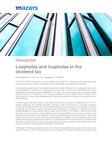
Loopholes and loopholes in the dividend tax
Law 1819 of 2016 introduced in our legal system the dividend tax. Due to the way it was structured, such tax suffers from several inaccuracies and contains gaps and loopholes, as follows:
A first loophole arises when the dividend is received by legal entities of a non-corporate nature, such as Corporations, Foundations or Associations, which may very well be shareholders of national companies and therefore receive dividends. In this case, since these entities are not taxable entities subject to the tax on dividends, no tax could be imposed on the dividend received, except for the income tax levy in case such distributed profits had not been taxed in the head of the company before their distribution.
A second gap arises with respect to dividends received by permanent establishments ("E.P.") of foreign companies, the clearest example of which is that of the branch of a foreign company. According to reiterated doctrine of the Superintendence of Corporations, since branches of foreign companies are not legal entities, they cannot be shareholders or partners in national companies (Superintendence of Corporations, Official Letter 220-071133 of 12/14/2005). In this sense, it does not make much sense that if these entities cannot be shareholders of a Colombian company, the dividend can be taxed on their head. But, assuming hypothetically that they could be, there would necessarily be the phenomenon of triple taxation because, in addition to having taxed the profit in the head of the company generating the same, it would be taxed in the head of the P.E. and then when the profit is transferred to its parent company abroad, the tax would be caused again since such transfer, in itself, is considered as the payment of a dividend.
A third gap, related to the previous issue, and under the hypothetical assumption that a branch of a foreign company or a PE is allowed to be a shareholder of a Colombian company, arises due to the fact that the regulation only taxes the dividend received by the PE or by the branch of a foreign company or entity and does not tax the dividend received by the PEs belonging to foreign individuals. Therefore, in the event that an E.P. belonging to a foreign or non-resident individual could be a shareholder of a Colombian company, the dividend received by the latter could not be taxed with the dividend tax.
A fourth loophole arises with respect to dividends that are paid in kind, but with species other than the companies' own shares (Official Notices 220-143915 of 10/18/2013 and 220-180473 of 4/09/2014 of the Superintendence of Companies). Thus, when the dividend is paid in kind, it will necessarily be considered as the payment in kind of a monetary obligation (dation in payment), considering that when the dividend is decreed in the company, it becomes an enforceable liability of the company. In this sense, the provisions of Article 29 of the Tax Statute must be applied, according to which "if in payment of obligations agreed in cash, the value of these is determined, unless proven otherwise, by the price established in the contract".
A fifth void or loophole occurs when in application of the regime of foreign controlled entities ("ECE" regime), dividends are received indirectly abroad which must be taxed in Colombia. The question here would be whether the Colombian taxpayer who theoretically receives the dividend must become a self-withholder of the same or whether such dividend tax would be declared and paid at the end of the taxable year, since clearly the payer of such dividend (foreign company) is not a withholding agent and therefore it is not possible to apply the provisions of paragraph 2 of article 245 of the Tax Statute.
These legal gaps or loopholes must be resolved by applying the constitutional and general principles of tax law, and not through the issuance of regulatory decrees that would exceed the powers that, by the principle of legality and reservation of law, correspond exclusively to the legislator.


